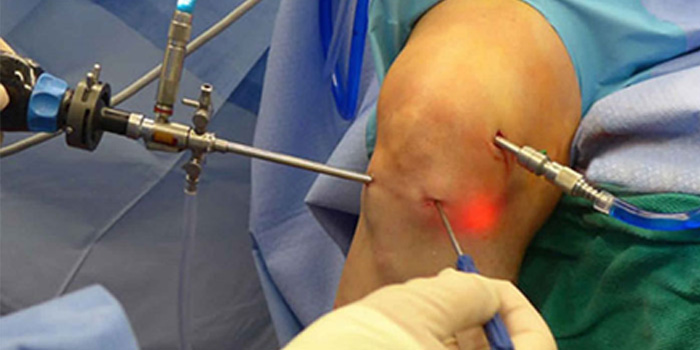
Knee - Arthroscopy and Sport Injury Specialist in Mumbai
Knee Arthroscopy
Dr. Aditya Pawaskar is one of the best Arthroscopic Surgeon and Sports Injury Specialist in Mumbai. With his extensive experience in orthopedics, he provides excellent care and effective treatments for patients with shoulder and knee problems.
Knee arthroscopy is a minimally invasive surgical procedure used to diagnose and treat a variety of knee joint problems. It involves inserting a small camera, called an arthroscope, into the knee joint through a small incision. This allows the surgeon to visualize the inside of the knee and perform various surgical procedures with the help of specialized instruments.
Here are some key points about knee arthroscopy:
Indications for Knee Arthroscopy:
- Diagnostic Purpose: Knee arthroscopy can help diagnose various knee problems when other diagnostic methods, like MRI or physical examination, are inconclusive. Conditions such as torn ligaments, meniscal tears, cartilage damage, and loose bodies can be accurately assessed through arthroscopy.
- Treatment of Meniscal Tears: Meniscus tears are a common knee injury. Arthroscopy can be used to trim or repair the torn meniscus, depending on the location and severity of the tear.
- ACL and PCL Reconstruction: Arthroscopy is often used to reconstruct torn anterior cruciate ligament (ACL) and posterior cruciate ligament (PCL) using grafts, typically from the patient's own tissues or donor tissues.
- Synovial Biopsy and Removal: In conditions such as rheumatoid arthritis or synovitis, arthroscopy can help take a biopsy of the synovial tissue (lining of the joint) and remove inflamed tissue to relieve pain and improve joint function.
- Cartilage Repair: Procedures like microfracture, drilling, or cartilage transplantation can be performed using arthroscopy to address localized cartilage damage and promote healing.
- Removal of Loose Bodies: Small fragments of bone or cartilage that are floating within the joint space can be removed during arthroscopy.
Advantages of Knee Arthroscopy:
- Minimally Invasive: Arthroscopy involves smaller incisions compared to traditional open surgery, leading to less tissue damage, reduced scarring, and quicker recovery times.
- Shorter Hospital Stay: Knee arthroscopy is usually performed as an outpatient procedure, which means most patients can go home on the same day.
- Faster Recovery: Patients often experience less pain and a faster return to normal activities compared to open surgery.
- Accurate Diagnosis: Arthroscopy provides a direct visualization of the joint, allowing for accurate diagnosis and targeted treatment.
Sports Prone to Knee Arthroscopy and Injury Risks:
- Cricket: The dynamic nature of cricket, especially the quick movements and frequent running, can contribute to knee injuries.
- Football (Soccer): Football involves sudden changes in direction and intense physical contact, increasing the risk of knee issues.
- Field Hockey: The fast-paced nature of field hockey may lead to knee injuries, especially due to quick turns and stops.
- Badminton: While badminton is generally low-impact, the sport's lateral movements and sudden accelerations can pose a risk to the knees.
- Kabaddi: The physical contact involved in Kabaddi may result in knee injuries, especially during tackles and rapid directional changes.
- Wrestling: Wrestling, with its intense physicality and rapid movements, can contribute to knee issues.
- Basketball: Frequent jumping, sudden stops, and pivoting in basketball increase the likelihood of knee injuries.
- Volleyball: Jumping and sudden lateral movements in volleyball may pose a risk to the knees
- Athletics (Track and Field): Certain track and field events, such as sprinting and jumping, can contribute to knee injuries.
- Weightlifting: The strain from heavy lifting in weightlifting may impact the knees over time.
Consult with Dr. Aditya Pawaskar, a Sports Medicine Specialist in Mumbai, to determine the most appropriate treatment for Knee injuries based on individual cases and the latest medical advancements.
